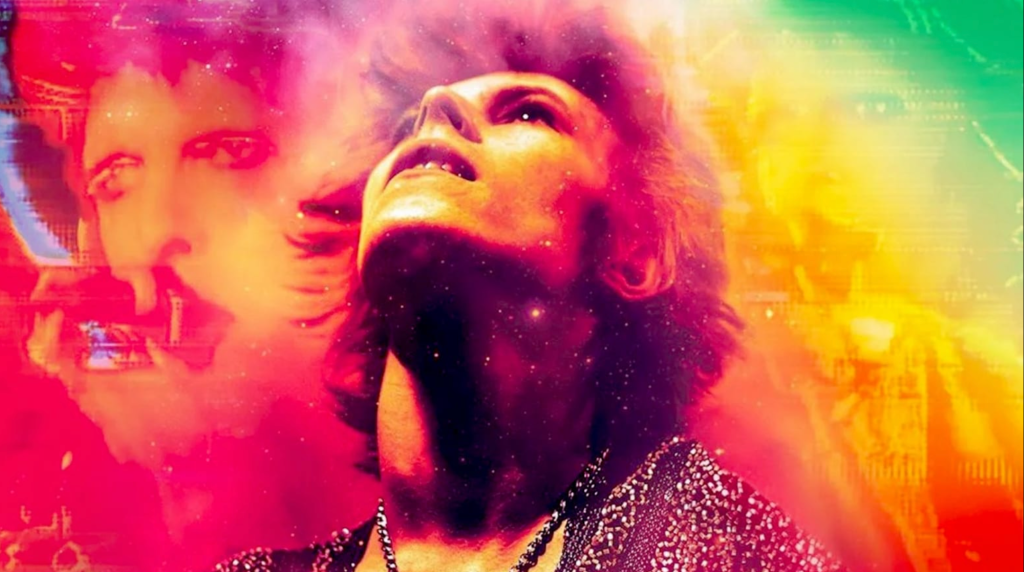Nobody’s likely to say filmmaker Brett Morgen didn’t reach for the stars in his David Bowie film – or ‘cinematic experience’ – Moonage Daydream.
At 140 minutes, it’s a full frontal assault on the senses, as rich in sound design as it is visually – not surprising given the star of the show, via interview clips, unseen archive material, concert footage and various voiceovers, provides the raw material for this layered and frequently overlapping collage of sound and vision.
As Morgen said at special MIFF 2022 screening on 13 September, there are already dozens of documentaries and countless books about Bowie, so the job of this film, like the man himself, is primarily to entertain.
Yes, we see and hear about Bowie’s falling in love with, and marriage to Iman Khan, but nothing about his first marriage to Angie Bowie, or anything about either of his children. Yes, we hear that his relationship with his mother was a little strained, but only in passing and without further elucidation. That’s not the point.
Like Ron Howard’s The Beatles: Eight Days a Week and – in terms of sheer spectacle – Elvis by Baz Luhrmann, the film tells a story without overt outside interference, evoking the sense of a life lived in real (and often telescopic) time.
Time, please
Time is a recurrent theme in the voiceovers from Bowie and the visuals from Morgen – on a small and universal scale, and in the sense that everything is transient: a philosophy (or simple awareness) that drove Bowie to live sometimes nihilistically for the day in his younger years and embrace a new and calmer sense of spirituality as time marched on.

That same spirituality, while refusing to be pinned down or aligned to any one tradition beyond ‘I love life very much indeed’, infuses the film with its cosmic overtones. ‘You’re aware of a deeper existence,’ Bowie’s voice states at one point. ‘Maybe a temporary assurance that indeed there is no beginning, no end, and you find yourself struggling to comprehend a deep mystery …’
Chaos, and the embracing of such, is shown as a conscious through-line in his life and output, and is mirrored by the texture of the film. Though it follows a roughly chronological bearing, from Space Oddity and Ziggy Stardust, through the 70s, 80s, 90s and (very briefly, but poignantly) the 2010s, the constant intercutting of stills, graphics and voiceovers from different eras makes it literally (especially on a gigantic IMAX screen) a dizzying experience.
As an artist, Bowie was at his happiest, as he puts it, when he was on ‘thin ice’ – not in the middle of any cultural moment but somewhere off to the side. Or, as many seemed to surmise, on an entirely different planet.
Bisexual shoes
While his embracing of sexual and gender fluidity have stood the test of time, the interviews in which he was asked about those elements of himself, often in a bemused and self-righteously prying way, certainly haven’t. In one, with Russell Harty in 1973, he is asked, among other weird questions, about his multicoloured platform sandals:
‘Are they men’s shoes or women’s shoes or bisexual shoes?’
To which he answers, with admirable restraint: ‘They’re shoe-shoes, silly.’
In something of a contradiction to his early stance, he finds himself willingly moving to the centre in the 1980s, an era in which he advertised Pepsi with Tina Turner, sang Dancing in the Street with Mick Jagger, and wrote what he considered the simplest musical material of his career, culminating in 1983’s Lets Dance album, with the titular track and Modern Love among its monster hits.
The accompanying global Serious Moonlight Tour was gargantuan in its success, bringing a level of fame and income that surpassed anything in his career until that point. And while the animus for that period was one of wanting to relax into what he did best – entertain – while finding human and emotional connection with his audience (which he did), it also led to him feeling bored as an artist and realising that, indeed, he was at his happiest when doing his own thing in his own way, with or without the adulation.
In this, we have the most endearing – and in its own way revolutionary – aspect of Bowie: he came in from the side, passed through the centre and went off again, by choice, to the outer edges. He was an artist who examined himself, reinvented himself and – contrary to his one-time Rock ‘n’ Roll Suicide leanings – felt more at ease with himself, and more determined not to waste his days, the older her got: enjoying married life, making music, painting portraits, writing, and shooting video art. Loving life.
Moonage Daydream is showing as part of MIFF 2022 and will be released in Australian cinemas on 15 September 2022.
More MIFF 2022 reviews on ScreenHub:
Actors:
Director:
Format: Movie
Country:
Release:





